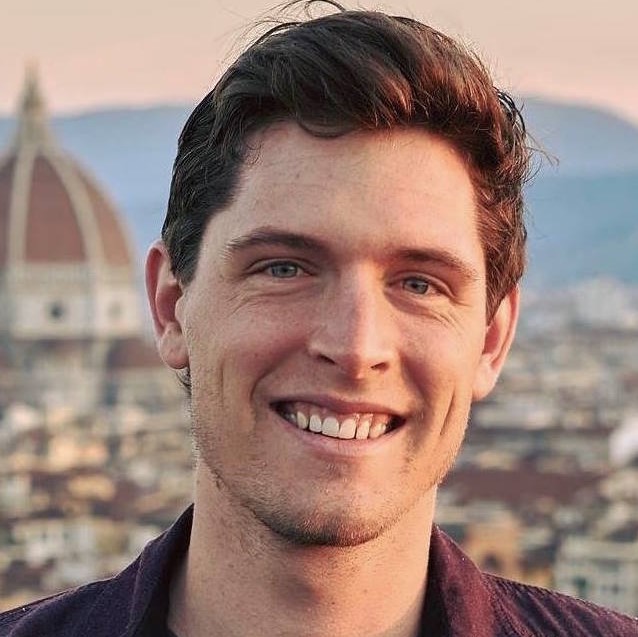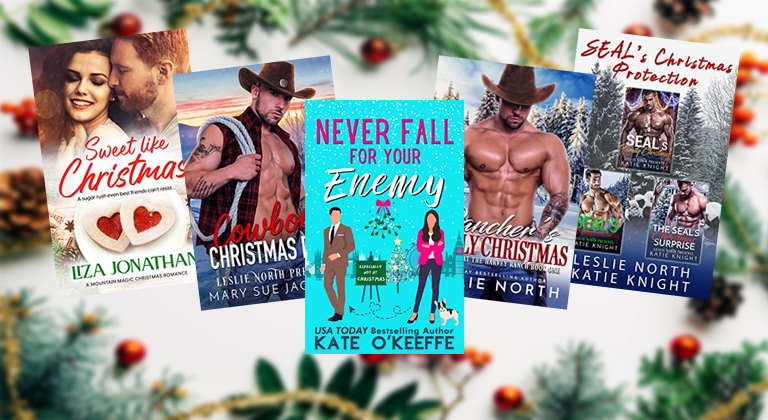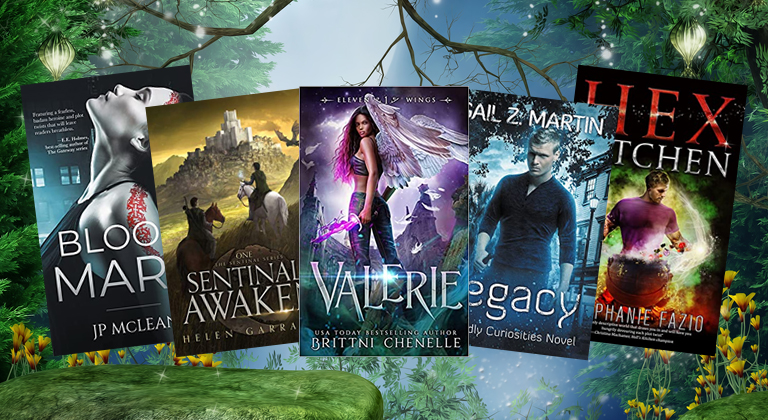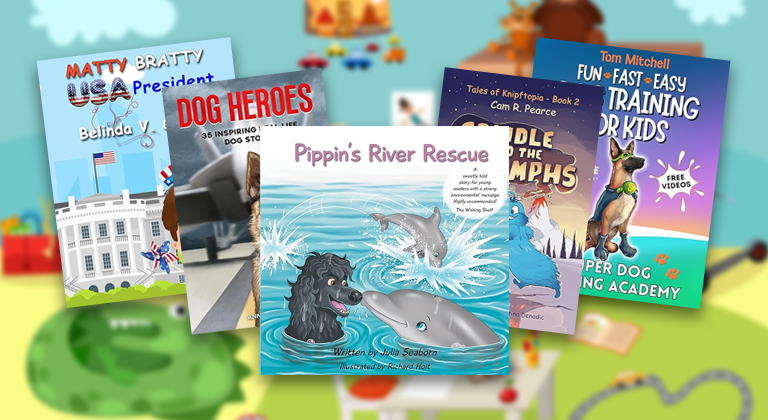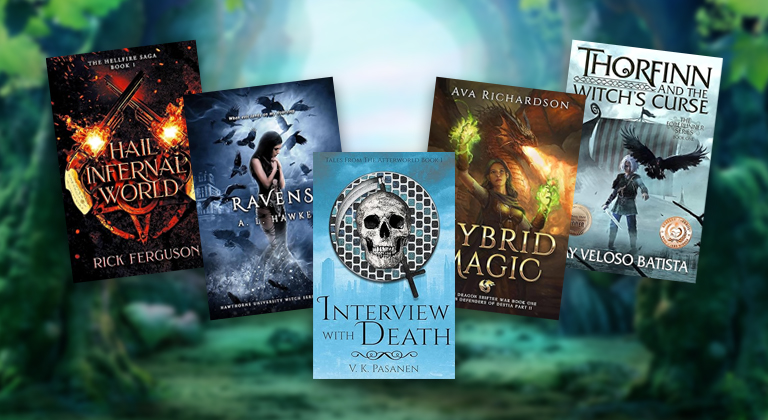Author Spotlight Interview: Sean Fletcher
Today’s interview is with Amazon-bestselling and award-winning author of YA fantasy, sci-fi, and middle grade fantasy, Sean Fletcher. We were honored to chat with Fletcher about his self-publishing journey, writing style and exciting upcoming projects.
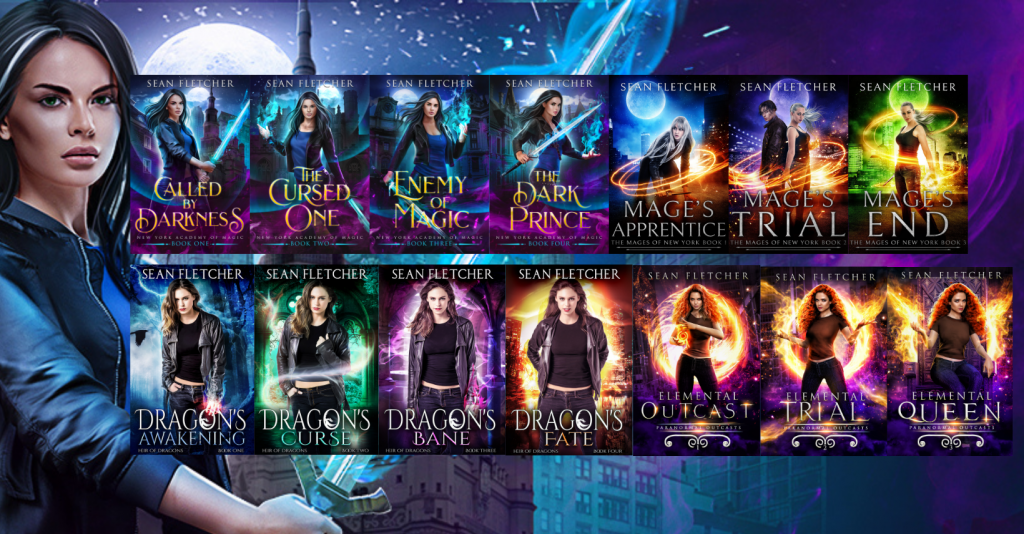
HG: To start, how would you describe yourself to somebody who isn’t familiar with your writing yet?
SF: I’m an author of young adult contemporary fantasy that’s chock full of everything from dragon-kin (dragon shifters), witches, mages, monsters, magic, mythology (lots of “M” words), and much, much more. To boil it down, I write fast-paced, twisty YA fantasy with deep, complex characters and stories, tons of magic, snark, heroes, anti-heroes, twists, and magical creatures (most recently dragons) all with some romance sprinkled in. One of my favorite things to do as a writer is create loveable heroes and heroines…and then torment them throughout my entire series. But it’s okay, they wind up okay in the end. Mostly.
In many of my books my characters are underdogs, ignorant of their magical abilities, who find themselves at the center of sinister plots, and have to fight to survive and beat the Big Bad Guy.
HG: Awesome! Where do you find inspiration or what inspires you to write your stories?
SF: This is one of those questions that I love but absolutely hate answering, because the truth is I don’t know! For me, stories have always been about taking difficult subject matter or complex themes and translating that into palatable fantasy settings with relatable characters that readers can interact with the world through. When I think of some of my favorite books and movies, it wasn’t just the story, world, and characters that made me love it; those that made me really think about something a different way, those that left an impact on me long after I’d left the theatre or closed the back cover were what really resonated me. I suppose those kinds of works are my inspiration and I strive with every new book to improve just a little bit more to try to make that a reality for my own work.
As far as where I get my ideas, the truth is mostly everywhere. Other books, my travels, awkward situations I’ve witnessed or been in, dangerous situations I’ve witnessed or been in, movies, things I see on the news or read about or just imagine while I’m daydreaming. Lately, more of my ideas for plots, themes, or scenes have been more conceptual, meaning the plot centers more around a central, unique idea that I try to play around with. These I get mostly from a lot of introspection about my own life and the lives of others (and let’s face it, we all had quite a bit of time for introspection this last year and a half; at least I did), and I try to translate more complex ideas and emotions into the attitudes and actions of my younger characters. Sometimes these ideas are a miss and sometimes they hit, but I love trying them out and they help fuel me to keep bettering my writing.
HG: What do you love most about writing YA urban fantasy?
SF: I may have touched on it a bit before, but I love the accessibility of writing fantasy. What I mean is that I feel it’s much easier to express difficult ideas, themes, or emotions through fantasy because so much of it is almost allegorical. Ideas that I find difficult to put into words if I was, say, writing my memoir, suddenly becomes so much easier to express when it’s told through the voice of my central character, or a villain, or any number of other ways.
Writing for young adult (though many of my readers are adults, and I’m sure other YA authors would agree) is so much fun because the characters are so much fun. I’m not a fan of creating stupid teenagers, but let’s be honest: we were all stupid at that age. Stupid, but brilliant, full of passion and life. There’s something about the excitement of discovering yourself through your tumultuous teenage years that’s incredibly fun to write about. Add a fantasy setting and it just makes it that much more fun.
Writing contemporary and urban fantasy especially has always been something I’ve been drawn to mostly because it’s how I imagine the world. Where does that rain gutter go? Perhaps to a subterranean lair where a horde of vicious rat people live. Extreme example, but you get the idea. How fun is it to imagine that, right next to us, or below our feet, or in those mysterious, undiscovered parts of our world or neighborhoods, could lie something much more exciting and fantastic than our everyday life?
On a more practical note, it’s much easier to write stories in modern day because, you know, I know a lot about modern day technology, customs, cultures, etc. But that’s just because I’m a lazy writer. 😊
I try to incorporate magical elements in mundane settings in all of my series, but I’d say the most fun I had was with the Mages of New York series and Darkness Within series. Much of those books happen in the heart of NYC—which I love visiting—and it was a total blast imagining all the different ways the fantasy world could blend seamlessly into our mundane world without normal humans ever being the wiser.
HG: I love that. How do you come up with character names?
SF: I used to make sure every character name had some sort of meaning associated with some component of their personality, but…meh, I don’t really do that anymore. For villains I typically find myself choosing names that have a more, I guess, sinister sound to them? Harsher? It’s difficult to explain but to me they sound very villain-y. For my heroes it again really comes down to what feels right. Sometimes I’ll have a character named one thing for my first couple drafts and come across a better name or just don’t get along with the current one so I’ll change it, but typically I pick my names and go with them. I guess you could say the characters sort of grow into them.
HG: That’s cool. Could you tell us a little bit about each series you’ve written, and what kind of readers would enjoy them?
SF: Sure thing! I’ll lead by saying that I have a pretty consistent style and tone, so if you like one of my series, there’s a good chance you’ll like my others. I always try to fill each series with as much magic, loveable characters, amazing plots, and fantasy goodness as I can so you can get completely sucked in.
Even though I write fantasy now, I’ll start waaaay back in 2016 with my first series, a science fantasy, and then move on to the present-day stuff:
My I Am Phantom series is about Drake Sinclair who’s born with superpowers. He doesn’t know how, he doesn’t know why, but a mysterious message from someone else with similar powers prompts him to start his search at his new college. The only problem is the other person who has the powers is a murderous psychopath, and the people who gave them both abilities is completely evil and wants to capture them both. If Drake wants to protect himself and his friends, he may end up having to ally with the villain, or wind up dead.
I’ve heard the Phantom series compared a lot to Marvel movies and other superhero works, so if that’s your thing, the Phantom series will be for you.
The Heir of Dragons series was a bit of a surprise for me. The idea is simple enough: Kaylee Richards discovers she’s a dragon-kin, a half dragon, half human. The problem? Her rare magic of summoning storms has attracted the Slayers, an ancient order dedicated to wiping out their kind. This was the first series I really merged my love of all things magical with something else I love: dragons. It has the quirkiness of Harry Potter, some sweet romance, and did I mention dragons?
This was also my first fantasy, and while I had a lot to learn about the genre, what surprised me was that it’s become my bestselling series by far. Readers really seem to connect with the characters and situations, especially as the series goes on, and the characters, tone, and stakes get darker. I love upping what’s at stake for the characters as the series progresses, and this one is no exception.
If you love everything good about contemporary fantasy—and dragons—then you’ll love this series.
The Mage’s Apprentice series (also known as the Mages of New York series) was where I really got to stretch my creative muscles and explore how a magical world would coexist in ours. It was also a way for me to imagine just how these different magical races would do living next to each other. Not well, as it turned out.
Aspen Rivest is a magic-less thief who, after a bungled theft, finds herself apprenticed to the most powerful Mage in New York, Lucien Dunadine. She then finds herself Lucien’s champion in a magical competition against the handsome Isaac. Did I mention she doesn’t have any magic of her own? But as Aspen and Isaac fight (and flirt) it becomes clear there’s something far more dangerous murdering magical creatures around New York and they’ll have to uncover who it is before they’re next.
Much like the Heir of Dragons there’s a ton of fun sass and snark in this series, along with some fun magical ideas, lots of adventure, and cool locations I drew from since I was traveling quite a bit during this time. This is also the series where I really started to tie my different series together. If you’ve read one of my books, I love dropping easter eggs, and hints to other places and characters from my other books.
The Darkness Within series follows Skylar Rivest, daughter of Aspen Rivest, as she tries to carve out a name for herself at the premier New York Academy of Magic. After being paired with the infuriating and handsome Asher, Skylar finds herself the target of an old enemy with a serious grudge against Skylar’s mother.
My first foray into writing in the first-person point of view, and it was a total blast. If you love witty banter and super-fast-paced stories, then this series is definitely for you!
The Paranormal Outcasts is my most recently completed series and so much fun to write. It starts with Riley Jameson getting murdered on the night of her birthday. But instead of pearly white gates she wakes up next to a glaring vampire, in a mysteriously magically house, and—oh yeah—she’s the key to an ancient prophecy. What comes next is Riley struggling to understand who, and what, she is, keeping the other violent paranormals from using her, and befriending the other twelve Outcasts who are tied in with each other in the prophecy.
This may be totally off, but Paranormal Outcasts is like a Fantasy Breakfast Club. The usual contemporary fantasy fun is there, and I had a lot of fun writing each of the Outcasts and throwing all of them into harrowing situations. Because I love torturing my characters. 😊
The newest series I’m working on is a continuation of the Heir of Dragons series (hooray, more dragons!) since fans have not. Stopped. Asking. For. More. Dragons.
I’m absolutely loving it so far!
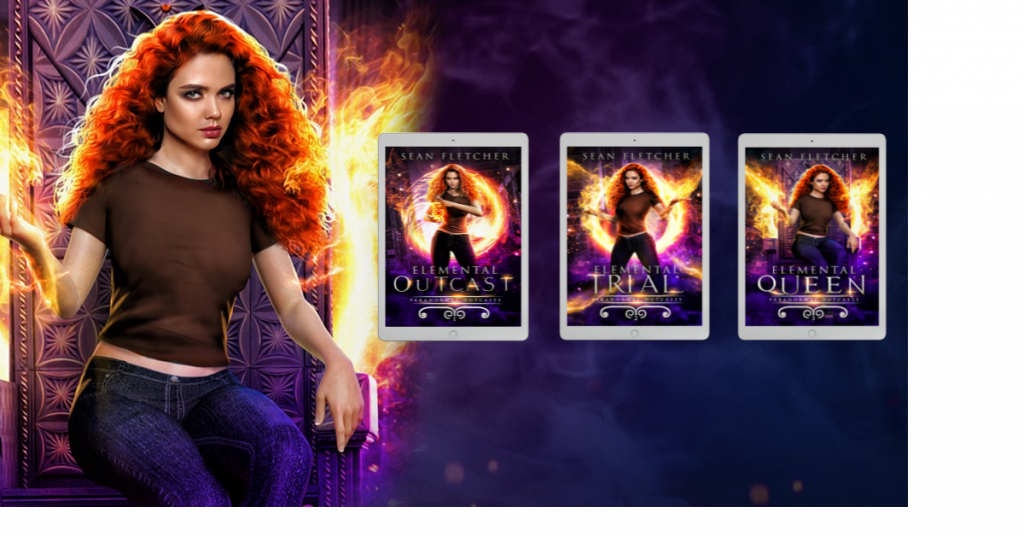
HG: Incredible! What feeling do you want to leave people with when they finish one of your novels?
SF: Kind of what I touched on earlier, I strive to write books that don’t just entertain you (because that’s why you’re reading, right? To be entertained), but to leave you thinking about the story, or characters, or themes, or all of that after you’ve finished. I love taking morally gray characters and putting them in morally gray situations. I really love getting readers to agree with a villain’s point of view. After all, every one of us is a hero in our own story, and a villain is no different.
I want readers to leave excited, thoughtful, entertained, and of course eager to go onto the next one.
HG: Has “author” always been your dream job? What was the most challenging part of your publishing journey?
SF: Ha! No. First I wanted to be a professional soccer play, then zookeeper, then I think aquarium attendant or something like that, before I got more realistic and went to school to be a veterinarian. Well that didn’t work out and I graduated with a wildlife biology degree, worked on a ranch for one summer, before taking the leap into the world of publishing. It’s not always easy working freelance, but it’s incredibly rewarding.
The hardest part of my publishing journey thus far is actually happening right now: finding my voice and who I am and being confident in what I write. Contrary to how this interview may come off, I often have a difficult time being proud of my own work. I’m incredibly hard on myself and want everything to be perfect. I also get intimidated by other authors.
This last year I’ve learned a lot about being content writing what I love. If you can find something you’re passionate about writing then that passion will shine through and readers will be drawn to it. For a time, I felt immense pressure to write a certain way or follow a certain trend. I did so a little and I feel my work suffered for it. Now I’m striving (though it’s a journey) to be confident in my work and slowly but surely build up my author brand.
HG: Thank you for sharing that. Tell us a little bit about your actual writing process. Did it change during the pandemic? When and where do you write?
SF: My process is in a constant state of flux, but typically it’s:
Write first thing in the morning, before anything else. I try to get at least ten pages of my current work in progress done. I typically entirely handwrite the first book in a new series, but sometimes I’ll handwrite large chunks of whatever I’m working on. Especially for complex scenes I find that handwriting is much easier to organize and get my thoughts down in the order I want.
Once I’m done with my first draft I’ll let it sit for a bit and plot or work on something else (I also write middle grade fantasy so that’s a nice change of pace if I’m working on a YA).
Then I’ll do a massive edit on the first draft either on my computer, or I’ll print it all out and do it by hand. Really depends on how polished I feel the first draft already is.
Then revise, revise, revise before sending it off to my editor.
Then revise, revise, revise (see a pattern here?) until I feel it’s as ready as I can make it.
Then I send it to beta readers, get their feedback, input it, before finally sending it off to a proofreader.
Nowadays I write at my computer at my desk, but I often leave the house and take a tour de coffee shops around the city and write at various venues. This was the biggest thing that changed during the pandemic since, obviously, a lot of the shops were closed. Most are tentatively opening back up, so it’s been nice to add this back to my routine again.
HG: Do you listen to music while you write? If so, what’s on your playlist?
SF: Sometimes yes, and sometimes I’ll get so wrapped up in what I’m working on that I’ll sit in total silence for hours without ever realizing it. Sometimes I forget to start the music but leave my headphones on anyway and feel like a total dufus. I’ve got a wide range of music on my Writing playlist from movie soundtracks, TONS of lo-fi, all the way to Irish bagpipe metal (it’s a thing, and yes, it’s awesome). Typically, I keep something mellow for most scenes, but if I want something intense for an action scene I’ll change it up.
HG: Awesome. Do you have any interesting writing quirks or rituals/traditions?
SF: Maybe? I guess the most interesting thing I do, as I mentioned before, is I almost always write the first book in a new series by hand. I absolutely love writing by hand and even have a ludicrously expensive but amazing fountain pen for it. I also geek out about paper because why not?
HG: Switching gears, what do you like to do when not writing?
SF: I love getting outside, traveling, cycling, walking, all that fun stuff. I spend a lot of time plotting my next trip and making a list of other amazing places I want to go. Besides that I spend a lot of time with friends and family, and learning some new skill or hobby.
HG: Sounds wonderful. If you could ask your author idol one question about their writing, writing process, or books, what would it be?
SF: Do they ever feel imposter syndrome or unconfident about their own works, and if so, what do they do about it? This is something I, and I’m sure many other, authors struggle with, and I’d always love to know if the greats feel the same thing. Does it get better? Is it just part of the tortured, pitiful condition of being a writer (dramatic sigh).
HG: Ah, yes imposter syndrome. Before we wrap up, what can you tell us about any projects you have in the works?
SF: So you know that Heir of Dragons series I mentioned? The one with the dragon-kin and the girl who discovers she’s part dragon? I’m writing a continuation of that, set in the same world, but with new characters, a new baddie, and lots, lots more magic and dragons.
Book one, Dragon Born, introduces our two leads, Kaden and Astrid. Kaden is a Slayer hunter, stopping the Slayers who kill dragon-kin like him. Astrid is a new dragon-kin with a violently volatile new magic. Though Kaden’s a loner, he decides to stick around to help Astrid master her power, and the both of them get caught up in a dangerous new Slayer leader’s sinister plan.
I’m hoping to release Dragon Born early next year, and the second book is well on the way. I don’t have a preorder yet, but anyone wanting to stay in the loop about what’s coming up next can join my author newsletter, and get two of my books free in the process 😊
HG: Great! We’ll keep an eye out. For readers that want to find out more about your stories and future projects, where should they go to connect or learn more?
SF: Stalk me! But seriously, you can find me on:
- Facebook Fan Page
- Fantasy Fiends Reader Group
- BookBub
- All my books: https://geni.us/SeanFletcher
If you love to read and leave reviews on Amazon, and would like to get books from authors like Sean Fletcher for free every day, then sign up for the Hidden Gems ARC program. Each day we send out emails with offers of free books in over 15 different genres, and you’ll only be sent the genres you’re interested in and the books you want to read. Sign up for as many or as few as you have time and interest for, we’ll keep the eBooks flowing as long as you want to keep on reading and reviewing!


